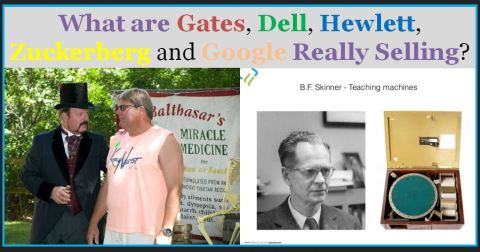 By Thomas Ultican / Ultican / Nov. 27, 2020
By Thomas Ultican / Ultican / Nov. 27, 2020
“Personalized learning” is being driven by foundations derived from companies that stand to profit by its implementation. Last year, George Mason’s Priscilla Regan and the University of Ottawa’s Valerie Steeves wrote the peer reviewed paper “Education, privacy, and big data algorithms: Taking the persons out of personalized learning” in which they state, “Other than the Carnegie Corporation, the private foundations who have been most supportive of personalized learning are those supported by the technology companies, including the Bill and Melinda Gates Foundation, the Chan Zuckerberg Initiative, and the Google Foundation.”
In the case of the Carnegie Corporation, the authors note that the philanthropy has been supporting education causes since its founding in 1911. Recently, Carnegie has given monetary support to “personalized learning” but “typically in partnership with one of the tech foundations.”
Based on a listing of the fifteen largest education spending philanthropies in the first decade of the millennium, the paper’s authors selected the technology linked Bill & Melinda Gates Foundation (the largest donor); Michael and Susan Dell (fourth largest donor); and William and Flora Hewlett Foundation (#8 in 2010) for analysis. They added two newer giving organizations, the Google Foundation and the Chan Zuckerberg Initiative, to complete their list of five tech associated education grant making companies to analyze.
In their review of scholarly papers and the popular press, they identified five types of activities supported by tech foundations with their K-12 spending:
“The first activity … involves grants to public schools for adoption of edtech applications, including personalized learning initiatives, or to educational initiatives to organizations working in public schools (such as Teach for America) or to organizations providing alternatives to public schools (such as charter schools).
“The second entails grants or some form of funding support for edtech companies.”
“The third area of activity is tech foundation support for coverage of edtech, especially coverage in publications directed to education professionals.”
“A fourth area of activity is tech foundation funding for research into studies evaluating the results of edtech applications, including personalized learning.”
“The fifth area of activity is tech foundation funding for advocacy groups who work in K-12 education.”
Three important observations from Regan and Steeves paper:
“We argue that, although there has been no formal recognition, personalized learning as conceptualized by foundations marks a significant shift away from traditional notions of the role of education in a liberal democracy and raises serious privacy issues that must be addressed.”
“It presents yet another example of the transformation of the traditional role of public education as educating citizens to one of educating future workers and consumers, a contrast of liberal democracy with neoliberal democracy.”
“The edtech sector has been focused on the notion [of personalized learning] …. While companies have generated hundreds of products and a smattering of new school models are showing promise, there is little large-scale evidence that the approach can improve teaching and learning or narrow gaps in academic achievement.”
After investigating education journalism, the authors chose to focus on Education Week as representative. The 1981 non-profit bills itself as “American education’s newspaper of record.” It has a print circulation of 50,000 and an online subscribership of 750,000 made up predominately of educators. Education Week has gotten an infusion of grant money from philanthropic foundations including $10 million from the Gates Foundation since 2005.
The authors concluded, “It accordingly is a site where various actors involved in personalized learning, including, teachers, school administrators, developers, policy-makers and foundations, share their views.” They also note that Education Week intersects with all five of the activity types supported by the tech foundations. For the study, they reviewed articles from the five year period 2013 to 2017.
What is being Sold?
“Personalized learning”, “blended learning” and standardized testing are three of the bigger items being promoted. Huge lobbying by big tech has turned the United States Education Department (USED) into a de facto tech sales firm. Statements like this abound on the USED web site,
“Transitioning away from seat time, in favor of a structure that creates flexibility, allows students to progress as they demonstrate mastery of academic content, regardless of time, place, or pace of learning. Competency-based strategies provide flexibility in the way that credit can be earned or awarded, and provide students with personalized learning opportunities.
These strategies include online and blended learning, dual enrollment and early college high schools, project-based and community-based learning, and credit recovery, among others. This type of learning leads to better student engagement because the content is relevant to each student and tailored to their unique needs.
It also leads to better student outcomes because the pace of learning is customized to each student.”
This grotesque distortion of reality is little more than propaganda backing technology based bad pedagogy. Tech provided schemes like “personalized learning” are founded on the behaviorist based mastery education theory. Besides promoting tech industry products, USED champions age inappropriate learning and publishes unfounded blather about better student outcomes.
The 1970’s “mastery learning” was so detested that it was renamed “outcome based education” in the 1990s and now is called “competency based education” (CBE). The name changes are due to the five-decade long record of failure. CBE is simply putting “mastery leaning” on a computer instead of using worksheets and paper assessments. In the 1970s teachers began calling it “seats and sheets.”
“Personalized Learning” is a euphemistic term that indicates lessons delivered on a digital device. These lessons are often organized with a playlist and come with a claim of using artificial intelligence to tailor the lessons to the recipient. The scheme is based on mastery learning theory.
For the remainder of this article, please go here.







{ 0 comments… add one now }